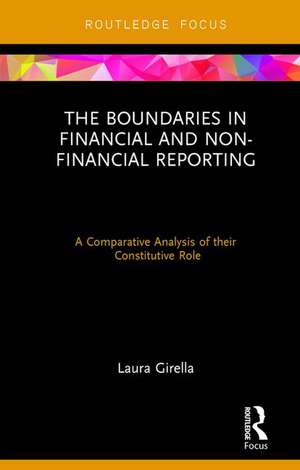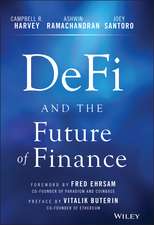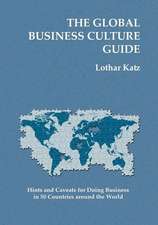The Boundaries in Financial and Non-Financial Reporting: A Comparative Analysis of their Constitutive Role: Routledge Focus on Accounting and Auditing
Autor Laura Girellaen Limba Engleză Hardback – 22 mar 2018
This innovative book reviews the guidelines and frameworks from the major relevant international organisations including: the International Accounting Standards Board, Global Reporting Initiative, Sustainability Accounting Standards Board, International Integrated Reporting Council, Carbon Disclosure Standards Board, and the World Intellectual Capital Initiative, and analyses their development and impact on the boundaries of financial and non-financial reporting.
Illustrated with case studies and interviews with representatives of these organisations, this concise volume makes a significant contribution to the future of reporting theory and practice. It will be of great interest to advanced students, researchers, practitioners and policy makers.
| Toate formatele și edițiile | Preț | Express |
|---|---|---|
| Paperback (1) | 186.32 lei 43-57 zile | |
| Taylor & Francis – 30 iun 2021 | 186.32 lei 43-57 zile | |
| Hardback (1) | 427.16 lei 43-57 zile | |
| Taylor & Francis – 22 mar 2018 | 427.16 lei 43-57 zile |
Din seria Routledge Focus on Accounting and Auditing
-
 Preț: 185.18 lei
Preț: 185.18 lei -
 Preț: 153.04 lei
Preț: 153.04 lei -
 Preț: 186.32 lei
Preț: 186.32 lei -
 Preț: 185.40 lei
Preț: 185.40 lei -
 Preț: 184.75 lei
Preț: 184.75 lei -
 Preț: 191.97 lei
Preț: 191.97 lei -
 Preț: 151.92 lei
Preț: 151.92 lei - 17%
 Preț: 127.98 lei
Preț: 127.98 lei -
 Preț: 165.68 lei
Preț: 165.68 lei
Preț: 427.16 lei
Preț vechi: 502.54 lei
-15% Nou
81.73€ • 85.57$ • 67.63£
Carte tipărită la comandă
Livrare economică 07-21 aprilie
Specificații
ISBN-10: 1138586900
Pagini: 130
Ilustrații: 6 Line drawings, black and white; 1 Tables, black and white; 6 Illustrations, black and white
Dimensiuni: 138 x 216 x 10 mm
Greutate: 0.45 kg
Ediția:1
Editura: Taylor & Francis
Colecția Routledge
Seria Routledge Focus on Accounting and Auditing
Locul publicării:Oxford, United Kingdom
Public țintă
PostgraduateCuprins
Notă biografică
Recenzii
Mario Abela, Director, World Business Council for Sustainable Development
Descriere
Although the need to expand the boundaries of financial reporting has been discussed since the mid-1990s, little consideration has been given to the evolution and discourses of integrated reporting of non-financial aspects. Yet by investigating how and why an organisation defines and its reporting boundaries, it is possible to understand what is truly "valued" (or not) in its business model.
This innovative book reviews the guidelines and frameworks from the major relevant international organisations including: the International Accounting Standards Board, Global Reporting Initiative, Sustainability Accounting Standards Board, International Integrated Reporting Council, Carbon Disclosure Standards Board, and the World Intellectual Capital Initiative, and analyses their development and impact on the boundaries of financial and non-financial reporting.
Illustrated with case studies and interviews with representatives of these organisations, this concise volume makes a significant contribution to the future of reporting theory and practice. It will be of great interest to advanced students, researchers, practitioners and policy makers.
















